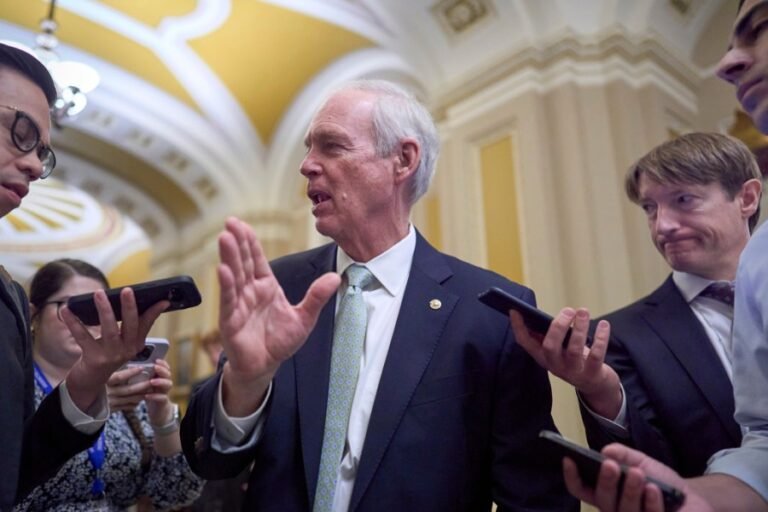
Republicans on Capitol Hill are staring down a key three-week stretch in their effort to enact President Trump’s ambitious tax agenda, with hopes that the House will be able to advance a compromise budget resolution at its conclusion to keep pace with the party’s aggressive timeline.
Senate Republicans last month adopted a budget resolution for their two-track strategy to advance Trump’s legislative agenda, moving ahead with an initial package that included funding for border and defense. Days later, the House GOP approved its framework for “one big, beautiful bill” full of Trump’s domestic policy priorities — including tax cuts — putting the two chambers on the collision course.
Since then, top lawmakers have been working across the Capitol to reconcile the two blueprints, discussing a number of key details, including how to make Trump’s 2017 tax cuts permanent.
Those conversations are expected to come to a head over the next three weeks.
Republicans are attempting to move large pieces of Trump’s agenda through a process known as reconciliation, which bypasses the Senate filibuster but must meet specific criteria. The budget resolution lays out the parameters for an eventual final bill.
Speaker Mike Johnson (R-La.) indicated that the upcoming stretch would be pivotal for the process.
“When we get back, this will begin in earnest,” Johnson told reporters earlier this month, before breaking for a week-long recess. “We’ll have leaders and lieutenants, committee chairs of jurisdiction in both chambers working together to begin that process to finish up the resolution and move forward with budget reconciliation.”
The matter currently resides in the Senate, where Republicans will work to amend and hammer out changes to the House’s budget resolution. The goal is to allow the lower chamber to vote on a compromise version before the end of the work period, with the Senate to follow after the next recess.
Headlining the to-do list is determining whether the GOP will be able to use the “current policy baseline” gimmick to score the bill in order to make the tax cuts permanent.
Under this idea, the current tax rates could be extended into the future indefinitely without adding to the deficit. The 2017 tax cuts are set to expire at the end of the year, and under the current scoring system, they would cost roughly $4.5 trillion over the next decade — the figure laid out in the House-passed budget resolution.
GOP leaders are supportive of this idea, but it must also pass muster with the Senate parliamentarian. Republicans are set to meet with the parliamentarian during this three-week stint.
“Most people feel there’s a good case for the current policy baseline. But that would definitely throw a wrench into it,” Sen. Thom Tillis (R-N.C.) said of the possibility the idea gets rejected.
Tillis, who is up for reelection next year, added that he would not be supportive of overruling or replacing the parliamentarian in order for the bill to be scored at the planned levels.
“That’s nuking the filibuster as far as I’m concerned. … That’s just ridiculous,” Tillis said. “Those are all versions of nuking the filibuster.”
“I’m just not taking a step down that slope,” he continued, “and I’m guessing we’ve got a few others that would feel the same way.”
There is also a question of whether enough hardline House Republicans will be on board with utilizing the maneuver. Conservatives — especially those in the House Freedom Caucus — have been adamant that the final reconciliation package must be deficit neutral, or reducing, and are warning that they will not accept a bill that includes less than the spending cut floor laid out in their budget resolution, even if the gimmick is utilized.
“No, it does have an impact,” Rep. Ralph Norman (R-S.C.) told reporters last month when asked if he would be supportive of using current policy baseline.
“If it changes much of anything, I’m talking about minor details, we’ve got a solid group that’s no, and we will do it,” Norman added, referring to the in-the-works compromise budget resolution. “And what we’ll ask the president to do, as he got involved in here, to get involved with the Senate.”
That apprehension poses a potential problem for Johnson, since he will need near-unanimity to get the compromise budget resolution through his slim majority. Final-hour lobbying from Trump has helped get skeptical House Republicans on board with big legislative undertakings in the past few months — including adopting the budget resolution.
The complicated conversations come as Republicans are looking to make good on their proposed timeline for moving the reconciliation package — which has emerged as another disagreement between the two chambers.
Johnson initially hoped to get the final package through the House the first week of April, and to Trump’s desk by Easter or Memorial Day, a plan that has already been pushed back because of the cross-Capital disagreements.
Some Senate Republicans, meanwhile, are eyeing an August deadline to get the package enacted, a timeline that Johnson threw cold water on last week.
“August is far too late,” the Speaker said. “We’re gonna move that ball a lot faster than that, and we’ll be talking with our colleagues and friends, Republican leadership in the Senate, about this.”
One thing that could alter that August deadline for Senate Republicans is if the so-called X-date to raise the debt ceiling is earlier than lawmakers anticipate. The House’s budget resolution contains a provision to deal with the debt ceiling.
The Congressional Budget Office has said it plans to announce the X-date by the end of the month.
Another major discussion members are set to have surrounds possible Medicaid cuts, which will almost certainly be needed to help fund the massive tax cut.
“We’ve got to look into other areas where we’re not harming the beneficiaries of some of these safety net programs, but we are definitely open to changes, and I think that’s going to put some people out of their comfort zone. It’s going to be critical,” Tillis said.
“All we’re doing is talking about is looking at some of the fraud and abuse in some of the program,” he said, specifically singling out Medicaid. “That’s going to have its own ups and downs with gaining votes on one hand, but then potentially losing votes on the other. It’s going to be that constant tug and pull for the next three weeks.”
This idea, though, has already started to make some lawmakers queasy. Sen. Lisa Murkowski (R-Alaska) told state legislators last week that she would not back a Medicaid cut “that hurts our people or puts you in a budget hole.”
Others have signaled their concerns to leadership on this front.
“Of course I have, from the standpoint of the participation in West Virginia’s enormous,” Sen. Jim Justice (R-W.Va.) told reporters last week, with nearly one-third of his constituents enrolled in Medicaid as of last year.
“None of us want to cut benefits,” he said. “But at the end of this whole process, should we not look at methodologies, that maybe some people would call a cut, that would make it better for everybody.”
As Republicans stare down the high-stakes work period, they are openly recognizing that the path to pass legislation could get murky as they work through a series of thorny matters in their effort to enact a large chunk of Trump’s legislative agenda.
“The process is going to be ongoing,” Sen. Rand Paul (R-Ky.) told reporters last week at the Capitol. “Probably what we’ll do is talk each other to death, stare at each other, and then eventually confuse the issue so much that it takes two months to unravel what we’ve agreed to.”


